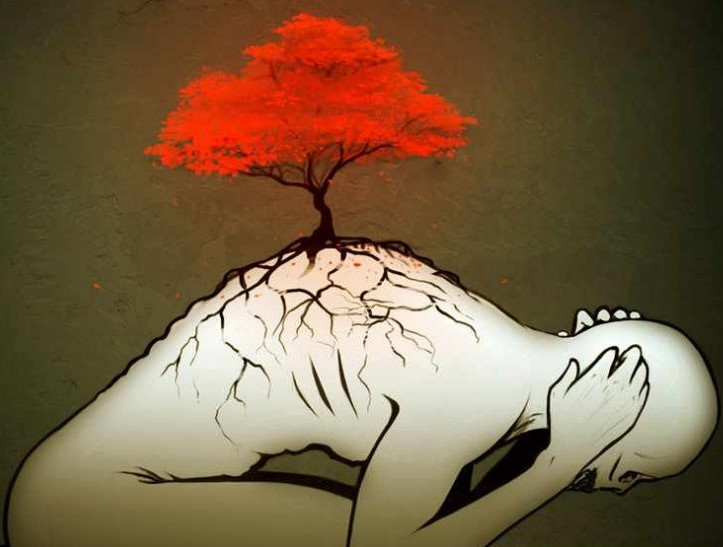Random processes notwithstanding, evolution has a lot invested in the human brain. But nature knows how and when to cut her losses, and we’re pushing our limits as a sentient, potentially sapient species.
 In truth, climate change is as much metaphor as reality. But a metaphor for what?
In truth, climate change is as much metaphor as reality. But a metaphor for what?
Externalizing the increasing crisis of human consciousness precludes meeting it. It’s obvious, though rarely acknowledged (and not just by climate change deniers) that human consciousness produced the climate crisis, as well as the mass extinction of animals with which we share the earth.
As with so many things that humans do, we’re faced with a vicious circle. We evolved the capability to separate, but not the wisdom to stop separating ourselves from nature and each other.
Without regard to ecological niche, we consume animals unnecessarily for food and other products, and then ask, what makes us different from other animals?
Clarity is denied when philosophers say circular things like: “Talk of how God made us in his own image is a metaphor for the very fact that we need to explain, namely that we treat the human being as a thing apart, a thing protected by a sacred aura.” Treat the human being as thing apart?
Does our separateness from nature and differences from other animals make humans special, or does our sense of specialness make us separate?
Neither. Humans are alienated because we extended the evolutionary adaptation of conscious separation into the psychological realm, where it doesn’t belong. Having the power to objectify nature, we assigned specialness to ourselves. Then we “built an edifice of rights and duties” to protect ourselves from ourselves.
When I hear a putative philosopher declare, “Morality is like a field of flowers beneath which the corpses are piled in a thousand layers,” I shudder with disgust and disbelief. In truth, morality is a field of corpses covered and camouflaged with a thousand layers of dead flowers.
Given what the world is, and has become, it’s beyond obtuse to maintain “morality is an evolved mechanism whereby the human organism proceeds through life sustained on every side by bonds of mutual interest.”
In fact, morality is the means by which the powerful control and exploit the weak, and whitewash their deeds with blather about “the bonds of mutual interest.”
It’s philosophical claptrap to utter a triple redundancy such as: “When I talk about myself in the first person…it is the heart of the I-You encounter.”
Do we “understand ourselves in the first person?” No. We cannot understand ourselves or anyone else when the personal, the subjective, the inviolable sense of “I” and “Me” is put before all else.
There’s great irony in philosophers citing evolutionary psychology to back up their claim of the validity of the separate, subjective self. If neuroscience has shown us anything, it is that the “I” is an illusion, a fabrication, a feeling arising from a trick of the mind. The self is indistinguishable from the entire field of thought.
The “I” is incapable of understanding itself because it depends on removing itself from the background of thought from which it arises. It is only by seeing through the illusion of psychological separation that we can begin to understand ourselves, and gain insight into what truly distinguishes human beings from other animals.
The ultimate paradox is that the evolutionary ability for separating things both gave humans the capacity for transcendent awareness of nature and the universe, and a great impediment to awakening transcendent awareness. Especially when philosophers persist with the inane existential position, “We meet one another I to I.”
The self is an object before it is a subject. The ability to consciously separate objects from the environment did not and does not stop with the utility of removing and recombining things. Humans have ineluctably made themselves, and others, into objects to be manipulated.
The brain’s evolutionary adaptation of conscious separation is a two-edged sword. On one hand, it gave humans tremendous power to manipulate nature; on the other, it has led to increasing fragmentation of nature and consciousness.
If nature abhors a vacuum, she loathes fragmentation. Another evolutionary leap is required.
I feel the intrinsic intent of cosmic evolution is to evolve, through random processes, brains capable of conscious communion with Mind. Though man is squandering it at present, only the human brain has that potential on this planet.
Awakening our capacity for communion with immanent Mind, God (or whatever one wants to call it), in the context of the spiritual potential of human brain, is therefore what rightly distinguishes us from other animals, without separating us from them at all.
Illumination begins with ending the illusion of “I,” the separate self, by observing to the movement of thought as the single stream it actually is.
Martin LeFevre
Link: https://www.nytimes.com/2017/03/06/opinion/if-we-are-not-just-animals-what-are-we.html

